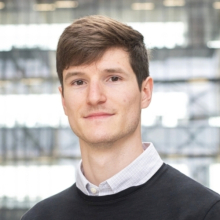EECS Seminar: Beam Learning for Full-Duplex Wireless Communication Systems in Future 5G/6G Networks

Abstract: For virtually their entirety, wireless communication systems have not been able to transmit and receive signals at the same time within the same frequency band, which has fundamentally constrained data rates, latency and coverage. Unlocking in-band full-duplex capability would rectify this, but it remains unclear how to successfully realize full-duplex in future 5G/6G wireless systems. In this talk, I will present two enabling solutions for full-duplex wireless systems, both of which use beamforming to cancel so-called self-interference present in such systems. The two proposed solutions both harness machine learning to quickly yet reliably design the transmit and receive beams of a full-duplex base station such that they couple low self-interference while delivering high SNR on the downlink and uplink. Notably, both solutions circumvent the need for explicit channel estimation but differ in how they address channel fluctuations over time.
Bio: Ian Roberts is an assistant professor in the Department of Electrical and Computer Engineering at UCLA, where he leads the Wireless Lab in conducting research on wireless communication and sensing. Prior to joining UCLA, he completed his Ph.D. at the University of Texas at Austin, where he was an NSF Graduate Research Fellow in the Wireless Networking and Communications Group. He has industry experience developing and prototyping wireless technologies at AT&T Labs, Amazon, Sandia National Labs, a startup, and a defense contractor. His research interests are in the theory and implementation of millimeter-wave systems, in-band full-duplex, satellite communication systems and other next-generation technologies for wireless communication and sensing. In 2023, he received the Andrea Goldsmith Young Scholars Award from the Communication Theory Technical Committee of the IEEE Communications Society.
Share
Upcoming Events
-
CEE Seminar: Walt Disney Imagineering, Construction Management – Internship Opportunities
-
MSE 298 Seminar: Stretching Possibilities: Strain-Tuned van der Waals Materials
-
MSE 298 Seminar: Low-Dimensional Quantum Materials Design Through Atomically Precise Film Synthesis
-
CBE 298 Seminar: Precision Engineering of Macromolecular Systems as Transducer Biomaterials
-
MSE 298 Seminar: Architected Materials for Energy and Health Care - The Spinodal Advantage
